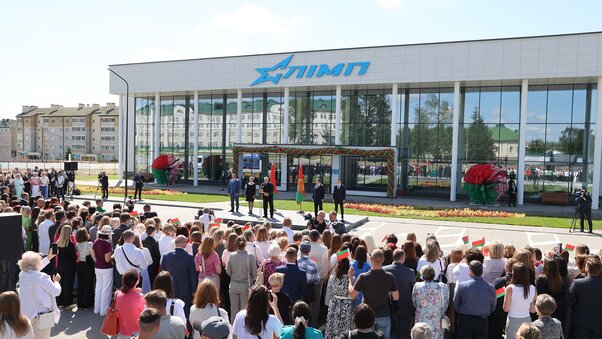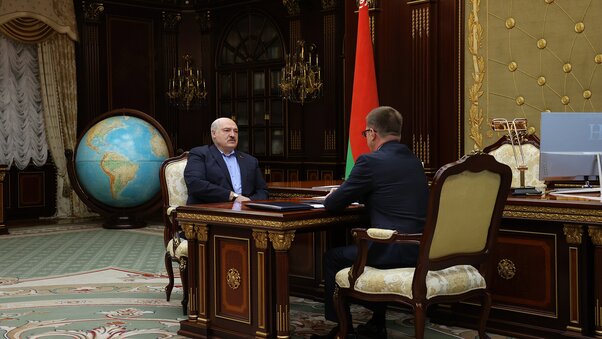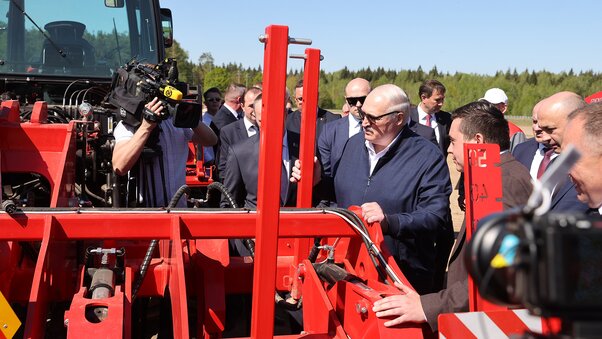Meeting to discuss harvesting, storm relief effort
- 24
- 38:11
Belarusian President Aleksandr Lukashenko is hosting a hybrid meeting where some participants have joined from the Palace of Independence, while others are taking part remotely via videoconferencing on 19 July.
Two main issues are on the agenda - harvesting and disaster relief effort in some regions of the country.
Taking part in the meeting are senior officials of the Government, the Belarus President Administration, a number of ministries and departments, the President’s authorized representatives in the regions and the city of Minsk, governors and heads of all districts of the country.
“Let’s hold our meeting in a businesslike manner. Your statistics are important, but these figures are never accurate for various reasons, including subjective ones. Therefore, I want a no-nonsense discussion about the things you need and the assistance we can provide. Starting next week, we will begin to keep track of the progress to resolve all the issues that will be raised today. This is what matters most. Ministers, Government members and others make upbeat reports about their heroic work and later on I see that the situation on the ground is a bit different. I don’t want that. Therefore, let’s talk about the problems you are encountering and do it in a businesslike and straightforward manner,” Aleksandr Lukashenko emphasized.
The head of state noted that now is the most crucial stage of the harvesting effort. “This year, the situation should be much better than in previous years. Especially when it comes to harvesting crops and grass. We have never supported agriculture more than this year. Equipment was provided and financial issues were resolved. If someone has under-fulfilled some tasks, we will discuss it today. I warn everyone against failing to deliver results. We have an unprecedented harvest on the fields today. That’s why we decided to hold a conference call,” the President said.
According to him, this year’s yield is expected to be significantly higher than last year’s. The President was told that the gross grain harvest will be about 10 million tonnes. Yet, Aleksandr Lukashenko emphasized that this should be a bare minimum. “Ten million is not bad, but this is the lower limit. Anything more than ten is good. Eleven is very good. Therefore, we must strive to have 11 million tonnes this year and get a good harvest. This pertains not only to cereals, but also to rapeseed,” Aleksandr Lukashenko noted.
“This is in theory. For the most part, grain crops are still on the fields, they need to be harvested quickly and without losses. In this case we will meet all the country’s needs for grain and fodder for the entire year and we will also save on imports. Yet, we have some hidden issues as usual,” the President noted.
Weather and management
The head of state noted that in the given weather conditions crops are ripening about 10-12 days earlier than last year. This means that harvesting deadlines have also moved up.
“We will have to harvest several crops at the same time, and crop harvesting overlaps with second and third cutting of hay, as well as with sowing of winter cruciferous crops. We know how to act in this situation, we have already done this before, we don’t need to invent anything. What we need is smart management, strong motivation of agricultural workers and iron discipline. What I have seen so far suggests that we don’t have it,” Aleksandr Lukashenko emphasized.
He remarked that smart management of seemingly ordinary processes can help save a lot of financial resources. For example, if you stop driving combine harvesters back and forth across the entire territory of a farm every day, but repair and guard them in the fields, you will be able to save thousands of dollars.
“Why am I so tough on this? Our agricultural sector is not private, and we also help private farmers, we subsidize agriculture a lot. You were asking for it, begging for equipment, combines, tractors, fertilizers. We went out of our way to give you what you asked for. So does the Government have the right to demand results? It does. So get down to work,” the President demanded.
He also warned against grain losses during harvesting: “We can get a huge financial effect from doing simplest things.”
“Prompt coordination between officials of all levels is vital. This also applies to the Ministry of Internal Affairs and the Emergencies Ministry,” added Aleksandr Lukashenko.
Eliminating violations
The State Control Committee and the Prosecutor General's Office have a special role to play in the harvesting campaign. There are reports of all kinds of violations, including theft, corruption, overreporting, poor condition of equipment and grain drying complexes, just to name a few. “If at least one combine or a dryer is not prepared for harvesting operations, it is a crime,” the head of state warned.
According to the Ministry of Internal Affairs, during this year’s sowing, 142 crimes were detected. Most of them are about stealing fuel. The police seized more than 50 tonnes of fuel, 14 tonnes of grain, 17 tonnes of feed, 7 tonnes of fertilizers, 50 liters of plant protection products. In addition to that, 29 incidents of taking bribes by officials of agricultural enterprises were documented.
Thus, a criminal case was launched against the head of the Postavy production site and a laboratory technician of the Polotsk bakery plant, who stole 9 tonnes of wheat grain in two days.
Condition of equipment
The condition of equipment remains a problem. “It would be okay not to have 2% of the machines in proper condition. But, as the State Control Committee points out, grain drying complexes were not operational in almost every fifth of the agricultural organizations they inspected. What are the authorized representatives and the aides [of the President] are doing about it? Some incidents are just incomprehensible,” the President said.
For example, at Myadelagroservis, three out of seven grain harvesters were not operational at the beginning of harvesting, and four harvesters did not pass state inspection. Their Don-1500B grain harvester manufactured in 2005 was not even registered with the State Technical Supervision Authority.
“What’s going on? If a district agricultural machinery maintenance service cannot get the equipment operational in its own area of responsibility, what can we demand from others?” asked the head of state. “Some have already forgotten that we declared 2024 the Year of Quality. And equipment is not the only problem. Low quality of works was reported already at the initial stage of harvesting,” the head of state noted.
According to him, such violations were reported at individual enterprises in Ivatsevichi District, Zhabinka District, Kamenets District, Stolin District, Svetlogorsk District, Korelichi District, Novogrudok District, Volozhin District and Osipovichi District.
The situation is similar with labor and technological discipline while harvesting and stocking fodder. Many enterprises have not fertilized perennial grasses with nitrogen fertilizers after the first cutting, which will negatively affect the yield of the second-cut grass.
Challenges
“I want to hear coherent reports on problems that we have. What is the human resources situation in the regions? Do we have enough drivers, machine operators, combine operators? I warned you back in the winter that every governor should have a plan on how to resolve personnel issues. The manufacturing industry and municipal authorities should lend a helping hand to replace workforce leaving the village. What is the condition of grain harvesters, drying and grain cleaning facilities? God forbid, we will come across an idle combine, or even worse, a grain dryer at some enterprise. What is the situation on the ground, what issues require immediate action? What needs to be done to bring all the equipment into operational mode?” the President asked.
Aleksandr Lukashenko also asked the Government and governors what assistance agricultural machinery manufacturers provide to agricultural enterprises.
“Are there any problems with its operation and maintenance? How are fuel issues resolved? What about Government procurement orders? I believe that this year there should be no problems with food grain procurement,” the head of state demanded.
“We also need to help people harvest crops on their farmsteads. The task should be dealt with primarily by district executive committees, village councils and heads of agricultural companies. Keep in mind that you will not be able to paper over problems. I am ready to help with any issues that require solutions at the highest level,” the Belarusian leader remarked.
During a hybrid meeting Aleksandr Lukashenko said that there are no major problems with the ongoing harvesting effort, yet good management is a must.
“I don’t see big problems. We just need good management. Authorized representatives will assess the situation on the ground today or tomorrow. Their decision is the final decision. If something needs to be decided, they will contact me. We will make a decision within a few hours,” said the head of state.
He also emphasized the importance of paying decent salaries. “Pay people. It will pay off. Support people who are trying hard and working well today,” Aleksandr Lukashenko remarked.
The President urged to observe all technological procedures. “Compliance with technology is a number one task. This is particularly relevant for eastern regions. Yet, every region has enterprises where this is an issue. Technology is at the heart of everything, as well as discipline. We don’t need anything else this year. Iron discipline and compliance with technology. This is the main thing,” he said.
The head of state remarked that the conversation about harvest primarily concerns grain given the current weather conditions.
“Well, we should not forget about grass feed, either. There is a lot of overlapping. And we need to sow. Literally in a week we need to start sowing winter rapeseed and then winter barley. Therefore, grain should be harvested in time,” said Aleksandr Lukashenko.
Commenting on the weather, the head of state remarked that some “great forecasters” were mistaken when in the spring they predicted a dry summer. “I said back then that there would be both wet and dry periods. The same weather pattern will continue throughout August. Now we are heading for a relatively dry period. I see this from satellite images. It will rain in some places, but it will not impede the harvesting effort. There will be more dry and sunny days. We need to make the most of this period,” the President noted.
“Thank God, we have enough moisture this year. It’s easier to plow. You remember how we plowed last year, when plowing raised swirls of dust on the fields. It was impossible to plow. The soil was dry like stone. Now you can plow pretty easily. But everything should be done in time,” the head of state said.
In this regard, he drew attention to the ongoing problem with drowned-out spots on the fields, which is still a problem in Brest Oblast and Grodno Oblast. “We agreed that today we need to buy crawler tractors with deep rippers to deal with this problem. We need to plow deeper. Maybe we will be able to remove these spots from the fields. The area of drowned-out spots is as big as the area of the land we reclaim every year. You fail here because of bad farming practices,” the Belarusian leader noted.
The President also gave instructions related to flax harvesting, as flax is a political crop in Belarus (flax flowers are featured on the country’s coat of arms).
The head of state recommended increasing the area under legumes that will be used as fodder. This includes alfalfa, clover, peas and lupine, Aleksandr Lukashenko remarked. “We need to return to what we once did. We need to increase the production of protein crops, including fodder crops. We need to buy alfalfa seeds and expand the area under this plant. This will all pay off. And if we purchase it in bulk from Russia or elsewhere, we will get a reasonable price for these seeds,” he said.
“In fact, we are doing quite well so far considering that we are in a risky farming zone. We shouldn't wait for perfect conditions. There won't be any and there have never been. It will be either very dry or very wet. By and large, this year is not bad for us. Moisture has never hurt our agriculture,” Aleksandr Lukashenko said.


